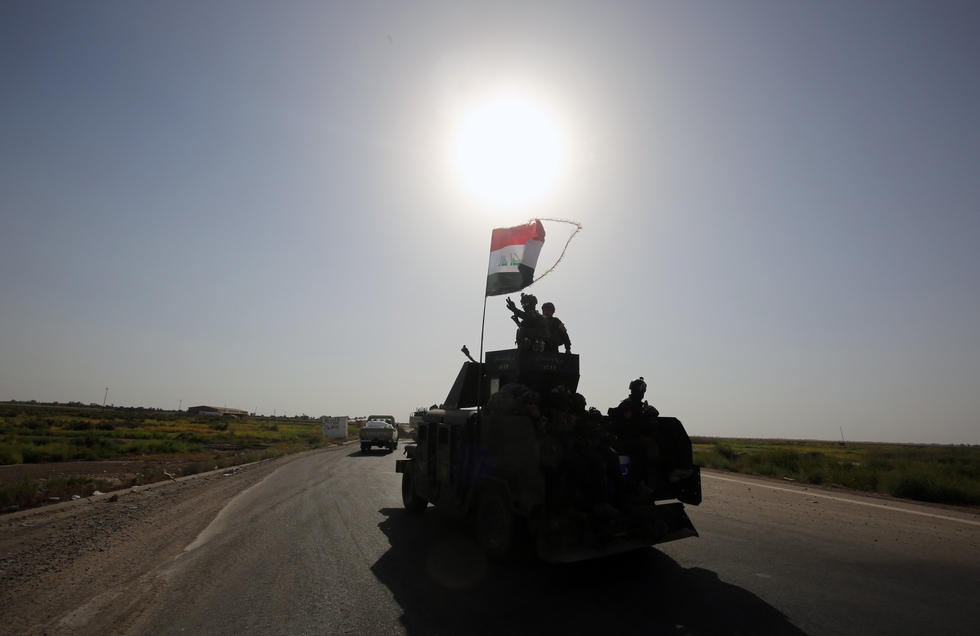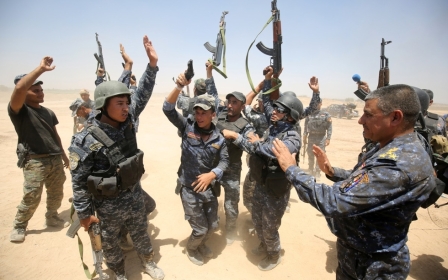Iraqi forces face tough battle on the streets of Fallujah

Iraqi forces thrust into the city of Fallujah from three directions on Monday morning, marking a new and perilous urban phase in the week-old operation to retake the Islamic State (IS) bastion.
Led by the elite counter-terrorism service (CTS), Iraq's most highly trained and experienced fighting unit, the forces pushed in before dawn, commanders said.
"Iraqi forces entered Fallujah under air cover from the international coalition, the Iraqi air force and army aviation, and supported by artillery and tanks," said Lieutenant General Abdelwahab al-Saadi, the commander of the operation.
"CTS forces, the Anbar [provincial] police and the Iraqi army, at around 4:00am (0100 GMT), started moving into Fallujah from three directions," he said.
"There is resistance from Daesh," he added, using an Arabic acronym for IS.
CTS spokesman Sabah al-Noman told AFP: "We started early this morning our operations to break into Fallujah."
As Iraqi forces doubled down on IS militants in and around Fallujah, the group appeared to be continuing a return to its early tactics of targeting civilians with car and suicide bombings, with 11 people reportedly killed in a string of suicide bombings in and around nearby Baghdad on Monday morning.
Three bomb blasts hit the capital and its outskirts, including the Shia-dominated district of Sadr City, with at least 20 people also wounded.
No group has yet claimed responsibility for the bombings, though the attacks follow a pattern of recent high-casualty assaults launched by IS in Baghdad over recent weeks.
Fears of hostility to anti-IS advance
The Iraqi government, under pressure over its security record, has pledged to retake the key, Sunni-dominated city of Fallujah, with Prime Minister Haider al-Abadi last week announcing the operation named "Break Terrorism".
However, US allies have struck a more cautious note, warning that there could be widespread support for IS among the city's residents.
"We really haven't fought a battle like this [before]," Lt Gen Sean MacFarland, who commands US forces and their allies in Iraq, said in an interview last week.
MacFarland warned that some of the city's residents had been "early adopters" of IS, saying "you could have a fairly large percentage of a fairly large city that's hostile to us."
Fallujah has been under IS control for longer than any other city in Iraq, and some officers involved in the operation to recapture it suspect that civilians there support the group.
"They are brainwashed by now," an Iraqi federal police officer told Vox on Monday. "They should be placed in a special camp."
The week-old operation aimed at a city where in 2004 US forces fought some of their toughest battles since the Vietnam War had previously focused on retaking villages and rural areas around Fallujah, which lies just 50 kilometres west of the capital Baghdad.
Only a few hundred families have managed to slip out of the Fallujah area ahead of the assault on the city, with an estimated 50,000 civilians still trapped inside, sparking fears the militants could try to use them as human shields.
The only families who were able to flee so far lived in outlying areas, with the biggest wave of displaced people reaching camps on Saturday night.
"Our resources in the camps are now very strained, and with many more expected to flee we might not be able to provide enough drinking water for everyone," said Nasr Muflahi, the Norwegian Refugee Council's Iraq director.
"We expect bigger waves of displacement the fiercer the fighting gets."
The Iraq branch of the UN's refugee agency said it had heard reports that some displaced people had killed themselves because "conditions are so dire".
Kenneth Roth, head of Human Rights Watch, said on Monday that he feared civilians in the city, already facing terrible conditions as a result of months of siege, could face "sectarian retaliation" by the Shia-dominated militia units that have been brought in to lead the offensive alongside the Iraqi army.
Concern for civilians
In Amriyat al-Fallujah, a government-controlled town to the south of the militant stronghold, civilians trickled in, starving and exhausted after walking through the countryside for hours at night, dodging IS surveillance.
"I just decided to risk everything. I was either going to save my children or die with my children," said Ahmad Sabih, 40, who reached the NRC-run camp early on Sunday.
Fallujah is one of just two major urban centres in Iraq still held by IS.
They also hold Mosul, the country's second city and de-facto IS capital in Iraq, east of which Kurdish-led forces launched a fresh offensive on Sunday.
The militants holed up in Fallujah are believed to number around 1,000.
It is not clear yet what resources IS is prepared to invest in defence of Fallujah, which has been almost completely isolated for months, but the city looms large in modern militant mythology.
A centre of learning for Iraq's Sunni Muslim minority that has been known as "the city of mosques," it was already a spark for a nationwide rebellion in 1920 against British colonial rule.
In November 2004, the US military suffered some of its worst losses in decades during an operation dubbed Phantom Fury which saw at least 95 members of the US forces killed in fierce combat against one of IS's previous incarnations.
Fallujah is expected to give Iraqi forces one of their toughest battles yet, but IS has appeared weakened in recent months and has been losing territory consistently over the past year.
According to the government, the organisation that has sewn havoc across Iraq and Syria over the past two years now controls around 14 percent of the national territory, down from 40 percent in 2014.
However, as the "caliphate" it declared two years ago unravels, IS has been reverting to its old tactics of bombings against civilians and commando raids.
Middle East Eye propose une couverture et une analyse indépendantes et incomparables du Moyen-Orient, de l’Afrique du Nord et d’autres régions du monde. Pour en savoir plus sur la reprise de ce contenu et les frais qui s’appliquent, veuillez remplir ce formulaire [en anglais]. Pour en savoir plus sur MEE, cliquez ici [en anglais].





